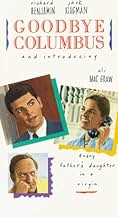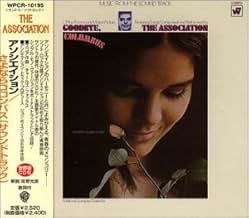PUNTUACIÓN EN IMDb
6,4/10
2,4 mil
TU PUNTUACIÓN
Añade un argumento en tu idiomaAn intelligent graduate and working-class Army veteran has an affair and clashes with a 'nouveau riche' young woman who cares not for birth control or the use of any other precautions to avo... Leer todoAn intelligent graduate and working-class Army veteran has an affair and clashes with a 'nouveau riche' young woman who cares not for birth control or the use of any other precautions to avoid pregnancy.An intelligent graduate and working-class Army veteran has an affair and clashes with a 'nouveau riche' young woman who cares not for birth control or the use of any other precautions to avoid pregnancy.
- Dirección
- Guión
- Reparto principal
- Nominado para 1 premio Óscar
- 4 premios y 9 nominaciones en total
Rey Baumel
- Uncle Harry
- (as Ray Baumel)
Reseñas destacadas
This film oozes charm. There are some similarities to "The Graduate" but messages conveyed are less heavy-handed. There are so many memorable scenes: the kid in the library, introducing college grads to each other, the wedding, etc. The casting is excellent and the resemblance of the younger daughter to the father is uncanny. The character "Ron" steals the show in some respects (I love to shake hands as he does when I encounter snobs). This is probably Richard Benjamin's best role and finest performance. I first saw this film when I was about ten. I've seen it about four times in total. It's certainly not for everyone. If you loved "Top Gun", skip it. If you like to champion good films that have been overlooked, check it out.
8wbe3
I recently saw this film again after seeing it when I was twelve (progressive Jewish parents).
I didn't remember much about it except that Ali MacGraw took her clothes off, that it reminded me A lot of my family at the time, and that there was a very moving scene in a library with Richard Benjamin and a small African American boy.
I was right on all counts -- Ali looks great (her first film), it STILL reminds me of my family and when I showed it to some friends of mine (also Jewish) they all said the same about their families, and the scene in the library is just as I remembered it. I was as moved today, some 36 years later, as I was back then.
A wonderful comedy.
I didn't remember much about it except that Ali MacGraw took her clothes off, that it reminded me A lot of my family at the time, and that there was a very moving scene in a library with Richard Benjamin and a small African American boy.
I was right on all counts -- Ali looks great (her first film), it STILL reminds me of my family and when I showed it to some friends of mine (also Jewish) they all said the same about their families, and the scene in the library is just as I remembered it. I was as moved today, some 36 years later, as I was back then.
A wonderful comedy.
A splendid film for a lot of reasons. The Phillip Roth novel from which the film was adapted supplies unusually good dialogue for the script and an excellent structure on which the director can hang visual and audio elements that meaningfully support the story. Check out how well the musical score shifts to support the mood of each scene. Then there is an excellent cast.
The title is a reference to the brother, a basketball player at Ohio State in Columbus, who frequently listens to an OSU sports commentary that signs off with "Goodbye Columbus". And the song lyrics "Hello life, goodbye Columbus" relate to leaving the protection of home/school to face the world.
Although "Goodbye Columbus" is usually thought of as the "The Graduate" with a different ending, it is much more like "Adam at 6AM". The three films were made at the very end of the 1960's, all had a searching young man as their main character, and all revolved around a new romantic relationship. But in "Goodbye Columbus" and "Adam" the tension is not between different generations but between different backgrounds and values. In both the young man eventually realizes that these differences cannot be overcome and both films go out with shots of him leaving.
At the time of its release "Goodbye Columbus" was more dated than the other two more "with-it" movies, which at least acknowledge the counterculture changes that were taking place at the time. Ironically, 35 years later, its failure to incorporate these references make it the least dated of the three films.
The soundtrack album featuring "The Association" (and incidental music composed by Charles Fox) was probably the kiss of death for that group's credibility whatever their musical merits. While cool to be part of an outside film like "Easy Rider", it was uncool to be associated with a Hollywood product like "Goodbye Columbus". This was the summer of Woodstock and by then "The Association" had pretty much lost their audience. In addition to the title song they contributed "It's Gotta Be Real" and "So Kind To Me."
It's two most famous scenes have held up very well: the montage of Ali MacGraw swimming during the title sequence and the comical wedding guests "pig-out" at the buffet table.
This was the film that really introduced fashion model Ali MacGraw to movie viewers. She was 28 playing a 21 year-old college student. Much more believably than just a year later in the somewhat pathetic "Love Story". Physically MacGraw passes fine for a younger woman and being older probably helped her hold her own in scenes with the more experienced Richard Benjamin, Nan Martin, and Jack Klugman. She is excellent in this role and manages to stay accessible and genuine while also projecting poise, grace and beauty.
Benjamin's character is genuinely attracted to MacGraw but seems to maintain a healthy skepticism about the romance (along with pretty much everything in life). MacGraw's Brenda finds him attractive because of his differences but she is really her Daddy's girl and her rebellion is more playful than serious. The best scene is the father-daughter session at the wedding very late in the film. Jack Klugman character knows just the right buttons to push and it is at this point that you know the romance is truly doomed.
The cinematography is first-rate and while the widescreen DVD showcases this, it has been inexcusably trimmed to qualify it for a "PG" rating. The DVD version is only 101 minutes long. Entire sequences have been deleted including the critical first sex sequence where birth control methods are discussed (foreshadowing) and the sequence with the rationale for his moving in with the family for two weeks. Also missing is all the vaguely graphic elements dealing with her initial refusal to have sex. If you are a first time viewer watching the DVD version and find puzzling narrative gaps in the story or incomplete motivational explanations, the trimming is the reason. The trimmed sequences are on the "R" rated VHS, so to see this as intended (widescreen and uncut) you will need to buy both the DVD and the VHS and reconstruct things.
The title is a reference to the brother, a basketball player at Ohio State in Columbus, who frequently listens to an OSU sports commentary that signs off with "Goodbye Columbus". And the song lyrics "Hello life, goodbye Columbus" relate to leaving the protection of home/school to face the world.
Although "Goodbye Columbus" is usually thought of as the "The Graduate" with a different ending, it is much more like "Adam at 6AM". The three films were made at the very end of the 1960's, all had a searching young man as their main character, and all revolved around a new romantic relationship. But in "Goodbye Columbus" and "Adam" the tension is not between different generations but between different backgrounds and values. In both the young man eventually realizes that these differences cannot be overcome and both films go out with shots of him leaving.
At the time of its release "Goodbye Columbus" was more dated than the other two more "with-it" movies, which at least acknowledge the counterculture changes that were taking place at the time. Ironically, 35 years later, its failure to incorporate these references make it the least dated of the three films.
The soundtrack album featuring "The Association" (and incidental music composed by Charles Fox) was probably the kiss of death for that group's credibility whatever their musical merits. While cool to be part of an outside film like "Easy Rider", it was uncool to be associated with a Hollywood product like "Goodbye Columbus". This was the summer of Woodstock and by then "The Association" had pretty much lost their audience. In addition to the title song they contributed "It's Gotta Be Real" and "So Kind To Me."
It's two most famous scenes have held up very well: the montage of Ali MacGraw swimming during the title sequence and the comical wedding guests "pig-out" at the buffet table.
This was the film that really introduced fashion model Ali MacGraw to movie viewers. She was 28 playing a 21 year-old college student. Much more believably than just a year later in the somewhat pathetic "Love Story". Physically MacGraw passes fine for a younger woman and being older probably helped her hold her own in scenes with the more experienced Richard Benjamin, Nan Martin, and Jack Klugman. She is excellent in this role and manages to stay accessible and genuine while also projecting poise, grace and beauty.
Benjamin's character is genuinely attracted to MacGraw but seems to maintain a healthy skepticism about the romance (along with pretty much everything in life). MacGraw's Brenda finds him attractive because of his differences but she is really her Daddy's girl and her rebellion is more playful than serious. The best scene is the father-daughter session at the wedding very late in the film. Jack Klugman character knows just the right buttons to push and it is at this point that you know the romance is truly doomed.
The cinematography is first-rate and while the widescreen DVD showcases this, it has been inexcusably trimmed to qualify it for a "PG" rating. The DVD version is only 101 minutes long. Entire sequences have been deleted including the critical first sex sequence where birth control methods are discussed (foreshadowing) and the sequence with the rationale for his moving in with the family for two weeks. Also missing is all the vaguely graphic elements dealing with her initial refusal to have sex. If you are a first time viewer watching the DVD version and find puzzling narrative gaps in the story or incomplete motivational explanations, the trimming is the reason. The trimmed sequences are on the "R" rated VHS, so to see this as intended (widescreen and uncut) you will need to buy both the DVD and the VHS and reconstruct things.
I had only a vague recollection of this film, but remembered it being rather unique. I bought the DVD because the film rarely shows up on TV. I was not disappointed. After 35 years, it holds up remarkably well. Sure, many props are out of date (cars, wired telephones), as are some of the cinematic techniques (clumsy zoom shots, montages), but the issues of social class and ethnic stereotypes remain highly relevant.
The disenfranchised and disillusioned hero became a staple of late 1960s movies, and this film actually makes a fine companion piece to "The Graduate." However, the two films diverge widely in resolving their conflicts, making the comparison all the more interesting.
Much of the credit for the success of this film, which is never less than engrossing, goes to the performers. Ali MacGraw is a revelation. In the years since, she has proved to be less than a great actress. Here, she's sensational. She's practically on screen the whole time, giving charm and nuance to the central character she plays. Jack Klugman is entirely convincing as her benevolent and loving father. Richard Benjamin does outstanding work as well. Supporting players are vulgar stereotypes, but serve as shorthand in getting the major themes across.
The film is an expert blend of humor and drama, leaving the audience with much to think about after it's over. Highly recommended.
The disenfranchised and disillusioned hero became a staple of late 1960s movies, and this film actually makes a fine companion piece to "The Graduate." However, the two films diverge widely in resolving their conflicts, making the comparison all the more interesting.
Much of the credit for the success of this film, which is never less than engrossing, goes to the performers. Ali MacGraw is a revelation. In the years since, she has proved to be less than a great actress. Here, she's sensational. She's practically on screen the whole time, giving charm and nuance to the central character she plays. Jack Klugman is entirely convincing as her benevolent and loving father. Richard Benjamin does outstanding work as well. Supporting players are vulgar stereotypes, but serve as shorthand in getting the major themes across.
The film is an expert blend of humor and drama, leaving the audience with much to think about after it's over. Highly recommended.
10maeander
The look of the film is very 1969 (the year it came out), but the attitudes are very much 1962. Two Dartmouth students yell with glee when they meet at a party that one is Class of '64 and the other is Class of '66. Brenda, the female lead character, relates how surprised she was when as a little girl her father had shown her 2 $100 bills. She had never seen a $100 bill before.
For a modern audience to enjoy this film, you have to look at it as a period piece. After all, the film's tag line is "Every father's daughter is a virgin". You know you are not in 2004. Not all of the biting satire still holds, but the romance does. Both Ali MacGraw and Jack Klugman give very warm, appealing performances.
It is amazing how many thing have changed in the last 35 years...and how many thing haven't changed. An interesting film from a time when there were "good girls" and "bad girls" and a bride wearing white meant something.
For a modern audience to enjoy this film, you have to look at it as a period piece. After all, the film's tag line is "Every father's daughter is a virgin". You know you are not in 2004. Not all of the biting satire still holds, but the romance does. Both Ali MacGraw and Jack Klugman give very warm, appealing performances.
It is amazing how many thing have changed in the last 35 years...and how many thing haven't changed. An interesting film from a time when there were "good girls" and "bad girls" and a bride wearing white meant something.
¿Sabías que...?
- CuriosidadesRichard Benjamin said of Ali MacGraw: "The camera looks into your soul, and it looked into Ali's. Men loved her, women loved her. She was a real movie star."
- PifiasAt the dinner table, Julie is told that it is earlier in Columbus, where Harriet is calling from, than where she lives in New York. In fact both cities are in the same Eastern Standard Time Zone. In the book, Harriet is calling from Milwaukee in the Central Time Zone, which is correct. However, when the screenplay changed her location to Columbus, the writer failed to realize this fact and change the dialogue or the city.
- Citas
Brenda Patimkin: Are you serious?
Neil Klugman: I'm way the hell past serious: I'm suicidal.
- ConexionesEdited into El chico que conquistó Hollywood (2002)
Selecciones populares
Inicia sesión para calificar y añadir a tu lista para recibir recomendaciones personalizadas
- How long is Goodbye, Columbus?Con tecnología de Alexa
Detalles
Taquilla
- Recaudación en Estados Unidos y Canadá
- 22.939.805 US$
- Duración1 hora 42 minutos
- Mezcla de sonido
- Relación de aspecto
- 1.85 : 1
Contribuir a esta página
Sugerir un cambio o añadir el contenido que falta

Principal laguna de datos
By what name was Complicidad sexual (1969) officially released in India in English?
Responde

























